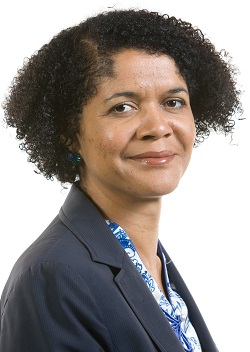Our guest blogger, Chi Onwurah MP, Newcastle Central’s elected MP and Shadow Minister for Culture and the Digital Economy, discusses her embracement of the term ‘intersectionality’, her experiences as a black female Geordie of Irish and Nigerian decent, brought up on benefits on a council estate by a single, disabled mother, and her career progression from a woman in STEM to a woman in Parliament.

I wish the term ‘intersectionality’ had been around in the eighties when I was growing up. I would have used it in response to the white women who told me to abandon my brothers in the Black Rights movement because they were sexist. I would have cited it to the black men who accused me of excusing racism by working with my sisters in the feminist movement. And I would have shouted it at the many, many white men who said it was all about class, that sexism and racism were passing bourgeois manifestations of imperialism and if I’d only wait for the revolution, they would deal with them in a benign and ideologically sound way.
But it wasn’t around so I had to learn what it meant the hard way, without a term for it, by questioning my own responses to experiences related to multiple aspects of my identity. For example when ‘feminist’ publishers highlighted sexism in a 19th century text by a woman, but ignored racism, I was annoyed but not sure why, given most mainstream imprints highlighted neither. Or when people refused to believe I was from Newcastle – ‘Where are you really from?’ – I was upset but again not sure why as I am proud of my Nigerian heritage.
Three years as the only heterosexual in a Black Lesbian Housing Cooperative helped, they took pity on me, and I shall always be grateful to them, not only for giving me a home but for helping expand my understanding of identity politics.
And as a black female Geordie of Irish and Nigerian decent, brought up on benefits on a council estate by a single, disabled mother, I certainly have plenty of identity to politicalise. But it wasn’t so much about the politics of any one of my multiple identities as not accepting someone else’s prioritisation of my identity and mistrusting anyone, anyone who asks me to choose. For me, intersectionality means whenever someone presents me with an OR, I demand an AND. And whenever we talk about discrimination, prejudice and bigotry, we need to consider how it impacts on everyone, how it intersects with life experiences beyond our own.
Wisely, I have never harboured ambitions to form a movement composed solely of Geordie Irish Nigerian working class women to change the world – recognising, celebrating and working with people with other experiences is essential for any movement which aims to reach beyond one demographic. That means respecting others’ experiences and understanding how we can support as allies those facing social justice challenges different from those we face ourselves, without seeking to erase their voices.
So while I was disappointed when Jeremy Corbyn appointed only men to the top five offices of state, what made me really unhappy was his response to criticism – that we should change our definition of what the top positions were. Being a man comes with many privileges, defining what constitutes women’s empowerment is not one of them.
Overall though whatever our differences in the Labour Party at the moment, we have far more in common than that which divides us, and there is real inspiration in being part of a wider movement, having a shared vision of where we want to end up collectively – a fairer, more just society – even if we may disagree about exactly how to get there.
Moving from engineering into politics has however highlighted to me the extent to which women in science and engineering have been largely ignored by the feminist movement. Of course the great issues which feminists have fought for – political representation, child care, equal pay – are important to women in STEM too, but some in the feminist movement saw technology as being inherently masculine and ‘exploitative’ in a way that was rarely argued with regard to politics.

During the two decades I worked in the tech sector I was almost always the only woman engineer in the room but I never heard this debated or discussed in feminist spaces. I believe that the lack of women in STEM is a feminist issue in itself and until we have science and technology which is representative of humanity in all its diversity we cannot know what humane science and technology would look like. That is the cause I champion in Westminster, at the intersection of my professional, political and personal lives.
Chi Onwurah MP
